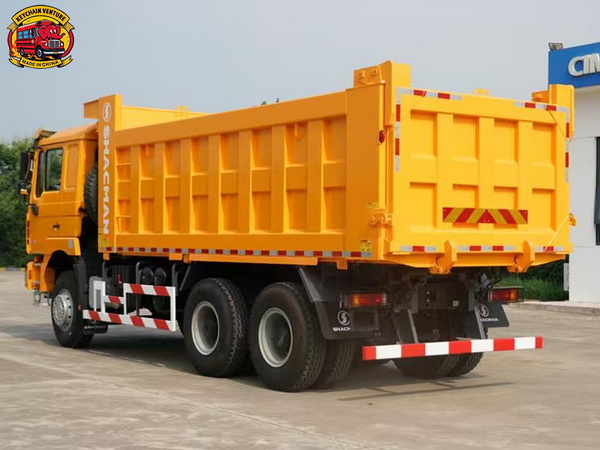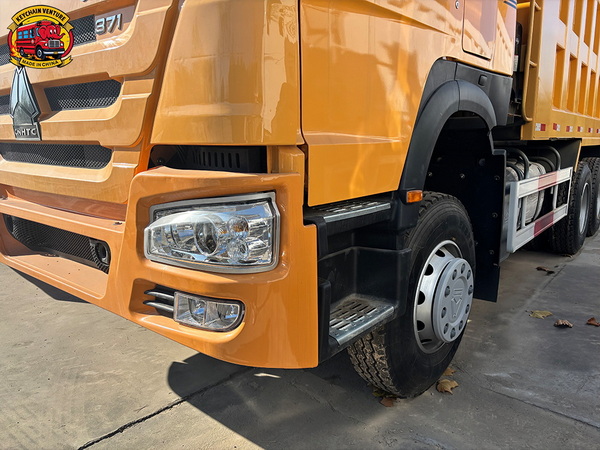Views: 222 Author: Amanda Publish Time: 2025-10-09 Origin: Site








Content Menu
● Types of Dump Trucks and Their Capacities
>> Articulated Dump Truck (ADT)
● Factors Affecting Dump Truck Load Capacity
● Load Capacities in Different Industries
● Advantages of High-Capacity Dump Trucks
● How KeyChain Venture Co., Ltd. Leads the Market
● Tips for Maximizing Dump Truck Performance
● Environmental and Economic Impact
>> 1. How many tons can a standard dump truck carry?
>> 2. What is the largest dump truck in terms of capacity?
>> 3. How do material types affect dump truck capacity?
>> 4. What safety measures ensure dump trucks are not overloaded?
>> 5. Are dump trucks used internationally, and how do regulations vary?
Dump trucks are essential vehicles used worldwide in construction, mining, and transportation industries. Their primary function is to move large quantities of materials such as sand, gravel, demolition waste, or ore efficiently. Understanding how many tons a dump truck can carry depends on multiple factors, including the type, size, and design of the truck. This article explores these factors in detail, with insights into the various dump truck classes, typical loads, and use cases.

A dump truck is a heavy-duty vehicle equipped with an open-box bed hinged at the rear, which can be lifted to dump its load on the ground behind the vehicle. Dump trucks can be found in many industries due to their practical design for transporting loose materials such as soil, rocks, and construction debris. This versatility makes them indispensable on jobsites ranging from small-scale landscaping to massive mining operations.
Dump trucks are designed to maximize both volume and weight capacity while maintaining safety and durability. Their robust construction allows them to withstand extreme loading and unloading cycles, often in harsh environments.
Dump trucks come in various sizes and designs, each suited for specific tasks. The most common types include:
The traditional dump truck has a hydraulic lift on its bed to unload materials. It generally carries between 10 to 16 tons, making it ideal for moderate hauling tasks. These trucks are commonly seen in cities transferring construction materials, roadwork gravel, and building debris.
An articulated dump truck features a hinge between the cab and the dump box, giving it greater maneuverability, especially in rough, uneven terrain. ADTs typically carry loads from 25 to 40 tons and are widely used in mining and heavy construction projects where rough terrain would challenge standard dump trucks.
Their articulated design allows the cab and dump body to pivot independently, enabling these vehicles to navigate sharp turns and difficult ground conditions without losing stability.
This truck carries a main dump box and pulls a separate trailer, significantly increasing payload capacity. A transfer dump truck can haul between 20 to 30 tons or more, depending on the model. This setup is particularly useful in bulk material transport because it combines the maneuverability of a standard dump with the capacity of a trailer.
Superdump trucks are outfitted with an extendable rear axle, allowing the truck to carry more weight while complying with road regulations. These trucks can carry up to 26 tons or more, making them very efficient for long-haul freight and large-volume material transport.
The superdump's ability to extend the rear axle adds additional legal weight capacity, making it one of the most cost-effective choices for heavy-duty hauling on highways.
Side dump trucks unload materials from the side instead of the back, allowing faster dumping and better stability. Their capacity is similar to standard dump trucks, between 10 to 16 tons, but their side dumping feature speeds up the unloading process, especially on uneven terrain or tight job sites.
Understanding how many tons a dump truck can carry involves multiple considerations:
- Truck Size & Design: Larger trucks with more axles can handle higher payloads safely. The number of axles distributes the weight to meet legal road restrictions.
- Material Density: Material weight varies by type — a cubic yard of gravel weighs more than the same volume of wood chips, affecting how much can be hauled before the truck reaches its weight limit.
- Road and Bridge Limits: Drivers must comply with local and national road regulations that set maximum gross vehicle weight. Overloading the truck can lead to fines, vehicle damage, and public safety hazards.
- Truck Bed Volume: This measures how much loose material the truck can carry. For example, a 12-cubic-yard bed carrying lightweight material will reach its volume before hitting weight limits, whereas a smaller bed carrying denser material will be limited by weight.

Dump trucks are used across multiple industries, and their load capacity often reflects specific operational needs:
- Construction: Dump trucks carry materials like sand, gravel, dirt, and demolition waste. Typically, this requires trucks in the 10–16-ton range for deliveries to and from building sites.
- Mining: Mining operations use massive articulated dump trucks capable of handling 25 to 40 tons or more per trip, transporting ore, rocks, and minerals from extraction points to processing sites.
- Landscaping: Smaller dump trucks are favored for carrying soil, mulch, and stones, often with capacities closer to 10 tons due to maneuvering constraints in tight spaces.
- Municipal Work: Side dump trucks and transfer dump trucks are used for road maintenance, snow removal, and waste transport, balancing payload with the need for quick, safe unloading.
Using larger dump trucks that carry more tons per load offers several benefits:
- Increased Efficiency: Fewer trips translate to less fuel consumption and reduced travel time.
- Reduced Labor Costs: Bigger loads require less manual handling and fewer truck operators.
- Lower Environmental Impact: Efficient logistics with bigger loads reduce carbon footprint per ton transported.
- Safety Compliance: Using trucks designed to maximize legal load limits minimizes the risk of accidents caused by overloading.
As one of China's leading commercial vehicle suppliers, KeyChain Venture Co., Ltd. offers a wide range of high-performance dump trucks optimized for various industries. Our vehicles exemplify cutting-edge technology, durability, and safety, meeting both domestic and international standards. Whether you need a dump truck for urban construction or large-scale mining, our products combine optimal tons per load with superior engineering.
Our dump trucks undergo rigorous testing to ensure long service life and easy maintenance. With innovative designs featuring advanced hydraulic systems, reinforced chassis, and efficient engines, our vehicles are crafted to handle the toughest working conditions.
To get the most out of your dump truck's tonnage capability, consider the following:
- Regular Maintenance: Frequent checks of hydraulic systems, tires, brakes, and chassis keep trucks in peak condition.
- Proper Loading Techniques: Evenly distributing the load avoids excessive stress on axles and prevents tipping.
- Weight Monitoring: Use onboard scales or portable weigh stations to avoid overloading.
- Operator Training: Skilled operators understand the limits of the truck and terrain challenges, improving safety and truck lifespan.
Heavy-duty vehicles like dump trucks have environmental considerations:
- Fuel Efficiency Improvements: Modern dump trucks incorporate fuel-saving technologies to reduce emissions.
- Load Optimization: By maximizing the tons carried legally in each trip, fewer vehicle movements are needed, reducing overall emissions.
- Material Handling Practices: Limiting spillage and ensuring proper unloading prevents environmental contamination and material waste.
KeyChain Venture Co., Ltd. prioritizes sustainability, offering dump trucks with engines compliant with the latest emission standards and manufacturing processes aimed at reducing environmental impact.
Dump trucks are indispensable for transporting vast amounts of loose materials efficiently in construction, mining, and other industrial sectors. The tons a dump truck can carry vary based on truck type, design, material density, and legal limits. Standard dump trucks generally haul 10 to 16 tons, articulated and superdump trucks handle larger loads, and specialized models offer unique benefits in maneuverability and volume.
Choosing the right dump truck for your operation ensures higher productivity, safety compliance, and cost efficiency. KeyChain Venture Co., Ltd. provides cutting-edge dump trucks tailored to diverse market needs, combining high payload capability with reliability and sustainability.

A standard dump truck typically carries between 10 and 16 tons, depending on its size and design, ideal for most construction and roadwork projects.
While commercial dump trucks usually carry less than 50 tons, specialized mining dump trucks can haul between 200 and 400 tons, designed specifically for heavy mining operations.
Material density plays a crucial role: heavier substances like gravel or ore reduce the volume hauled due to weight limits, while lighter materials such as mulch allow for fuller loads.
Operators use weight scales, follow legal limits, maintain vehicle condition, and undergo training to prevent overloading and ensure safe transportation.
Dump trucks have global usage, with design and load regulations differing between countries. Manufacturers like KeyChain Venture Co., Ltd. produce models that comply with both domestic and international standards.
Field Visit To DR Congo – Products in Action, Friendships in Progress
Treat Your Team to the Perfect Ending: A Cultural Day & Rejuvenating Massage
Just received this absolutely gorgeous bouquet specially ordered by our lovely customer!
Truly inspiring conversations today with our highly insightful client!
Today, we visited the bus company together with our client. It was really wonderful!
A Milestone Moment: Custom Buses Successfully Shipped, Setting Course for New Horizons
Forging Stronger Ties: Welcoming Key African Partners to Chongqing for Transport Collaboration